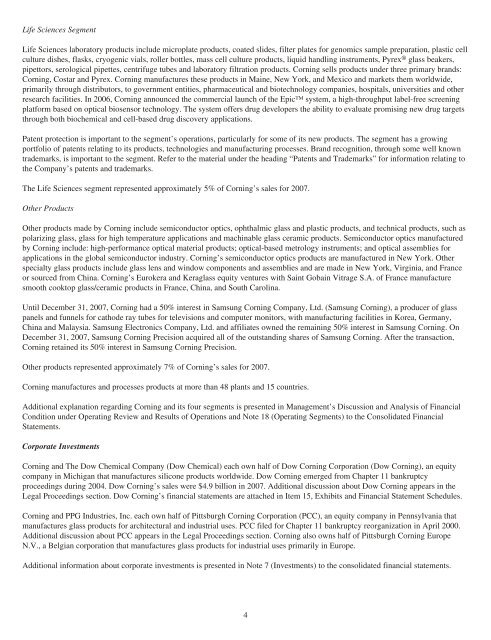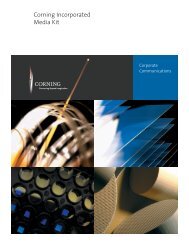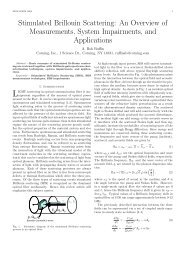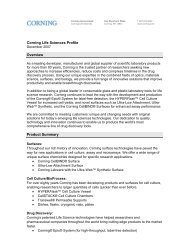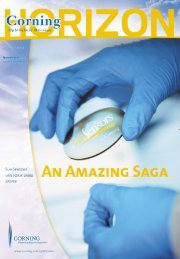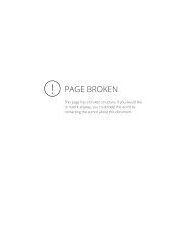You also want an ePaper? Increase the reach of your titles
YUMPU automatically turns print PDFs into web optimized ePapers that Google loves.
Life Sciences Segment<br />
Life Sciences laboratory products include microplate products, coated slides, filter plates for genomics sample preparation, plastic cell<br />
culture dishes, flasks, cryogenic vials, roller bottles, mass cell culture products, liquid handling instruments, Pyrex ® glass beakers,<br />
pipettors, serological pipettes, centrifuge tubes and laboratory filtration products. <strong>Corning</strong> sells products under three primary brands:<br />
<strong>Corning</strong>, Costar and Pyrex. <strong>Corning</strong> manufactures these products in Maine, New York, and Mexico and markets them worldwide,<br />
primarily through distributors, to government entities, pharmaceutical and biotechnology companies, hospitals, universities and other<br />
research facilities. In 2006, <strong>Corning</strong> announced the commercial launch of the Epic system, a high-throughput label-free screening<br />
platform based on optical biosensor technology. The system offers drug developers the ability to evaluate promising new drug targets<br />
through both biochemical and cell-based drug discovery applications.<br />
Patent protection is important to the segment’s operations, particularly for some of its new products. The segment has a growing<br />
portfolio of patents relating to its products, technologies and manufacturing processes. Brand recognition, through some well known<br />
trademarks, is important to the segment. Refer to the material under the heading “Patents and Trademarks” for information relating to<br />
the Company’s patents and trademarks.<br />
The Life Sciences segment represented approximately 5% of <strong>Corning</strong>’s sales for <strong>2007</strong>.<br />
Other Products<br />
Other products made by <strong>Corning</strong> include semiconductor optics, ophthalmic glass and plastic products, and technical products, such as<br />
polarizing glass, glass for high temperature applications and machinable glass ceramic products. Semiconductor optics manufactured<br />
by <strong>Corning</strong> include: high-performance optical material products; optical-based metrology instruments; and optical assemblies for<br />
applications in the global semiconductor industry. <strong>Corning</strong>’s semiconductor optics products are manufactured in New York. Other<br />
specialty glass products include glass lens and window components and assemblies and are made in New York, Virginia, and France<br />
or sourced from China. <strong>Corning</strong>’s Eurokera and Keraglass equity ventures with Saint Gobain Vitrage S.A. of France manufacture<br />
smooth cooktop glass/ceramic products in France, China, and South Carolina.<br />
Until December 31, <strong>2007</strong>, <strong>Corning</strong> had a 50% interest in Samsung <strong>Corning</strong> Company, Ltd. (Samsung <strong>Corning</strong>), a producer of glass<br />
panels and funnels for cathode ray tubes for televisions and computer monitors, with manufacturing facilities in Korea, Germany,<br />
China and Malaysia. Samsung Electronics Company, Ltd. and affiliates owned the remaining 50% interest in Samsung <strong>Corning</strong>. On<br />
December 31, <strong>2007</strong>, Samsung <strong>Corning</strong> Precision acquired all of the outstanding shares of Samsung <strong>Corning</strong>. After the transaction,<br />
<strong>Corning</strong> retained its 50% interest in Samsung <strong>Corning</strong> Precision.<br />
Other products represented approximately 7% of <strong>Corning</strong>’s sales for <strong>2007</strong>.<br />
<strong>Corning</strong> manufactures and processes products at more than 48 plants and 15 countries.<br />
Additional explanation regarding <strong>Corning</strong> and its four segments is presented in Management’s Discussion and Analysis of Financial<br />
Condition under Operating Review and Results of Operations and Note 18 (Operating Segments) to the Consolidated Financial<br />
Statements.<br />
Corporate Investments<br />
<strong>Corning</strong> and The Dow Chemical Company (Dow Chemical) each own half of Dow <strong>Corning</strong> Corporation (Dow <strong>Corning</strong>), an equity<br />
company in Michigan that manufactures silicone products worldwide. Dow <strong>Corning</strong> emerged from Chapter 11 bankruptcy<br />
proceedings during 2004. Dow <strong>Corning</strong>’s sales were $4.9 billion in <strong>2007</strong>. Additional discussion about Dow <strong>Corning</strong> appears in the<br />
Legal Proceedings section. Dow <strong>Corning</strong>’s financial statements are attached in Item 15, Exhibits and Financial Statement Schedules.<br />
<strong>Corning</strong> and PPG Industries, Inc. each own half of Pittsburgh <strong>Corning</strong> Corporation (PCC), an equity company in Pennsylvania that<br />
manufactures glass products for architectural and industrial uses. PCC filed for Chapter 11 bankruptcy reorganization in April 2000.<br />
Additional discussion about PCC appears in the Legal Proceedings section. <strong>Corning</strong> also owns half of Pittsburgh <strong>Corning</strong> Europe<br />
N.V., a Belgian corporation that manufactures glass products for industrial uses primarily in Europe.<br />
Additional information about corporate investments is presented in Note 7 (Investments) to the consolidated financial statements.<br />
4


